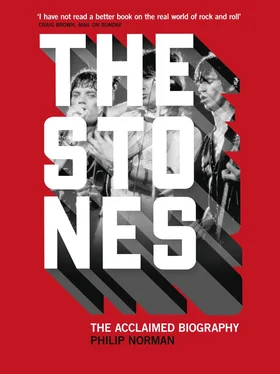Oldham’s journeys north, though chilly and unglamorous, brought one further big advance. In Manchester, he met Tony Calder, a young agent handling local groups like the Hollies and Wayne Fontana and the Mindbenders. Manchester groups were by now starting to benefit from London’s obsession with the Mersey Sound. Tony Calder also took on Oldham as publicist for his firm, Kennedy Street Enterprises. ‘It felt just like tiddlywinks. I’d already got Liverpool sewn up, with Epstein and NEMS. Now I’d got Manchester as well.’
A chance PR assignment for the American record producer Phil Spector, early in 1962, altered Oldham’s conception of how he might seize his still unspecified destiny. Up to then, in pop music, celebrity had come only to performers – the singers first, then the star guitarists and, latterly, the groups. No fame, or even credit, was given to the A & R men who arranged and supervised even the biggest hit recordings. Phil Spector was the first A & R man to be as well known as the artists he recorded – to produce each three-minute disc in his individual and unmistakable style of complex multitrack effects and cavernous echo: the Spector Wall of Sound.
Phil Spector became the epitome of all Andrew Loog Oldham wished to be. His persona was that of a semi-gangster, riding round in dark-windowed limousines, protected by ugly bodyguards with bulges under their arms. While Spector was in London, Andrew Loog Oldham rode round with him, devoutly questioning him about the secret of his success. Instead of the hoped-for technical hints, Phil Spector imparted a piece of advice which Oldham at the time found rather disappointing. If Oldham ever found a group to record, Spector said, he should on no account let them use the record company’s studio but should instead pay for an independent studio session and afterwards sell or lease back the tapes to the record company. That way, you had control and you had much more money.
In April 1963, the Beatles were number one in every chart with From Me to You. Gerry and the Pacemakers were Number Two with How Do You Do It? Oldham lost his retainer from NEMS Enterprises, and began looking around for something else to make up that monthly £25. Calling in at the Record Mirror office – a habitual haunt of his for picking up tips – he found Peter Jones enthusing over an unknown blues group whose fortunes Norman Jopling was about to change with a eulogistic article. As Oldham listened, the pop singer and the publicist faded; a brand-new incarnation of himself took shape on his mental Cinerama screen.
He drove to Richmond the very next Sunday. In the narrow passageway beside the Station Hotel, he met a boy and girl coming out into the warm spring dusk. Neither Mick Jagger nor his girlfriend Chrissie Shrimpton noticed Andrew Loog Oldham, for the simple reason that they were having a furious argument.
The Crawdaddy that night was anything but the wild spectacle Norman Jopling had described. Giorgio Gomelsky had been called away to Switzerland by the death of his father. Without Giorgio to enliven it, the club was in a torpid mood. The Stones had even resumed their old purist habit of playing seated on a ring of bar stools. ‘There was no production,’ Oldham says. ‘It was just a blues roots thing … “Here I am and this is what I’m playing.” Even so, I knew what I was looking at. It was Sex. And I was maybe forty-eight hours ahead of the pack.’
Suffering an uncharacteristic fit of shyness, Oldham did not approach the Stones that first night. For all his hubris, he knew he was in no position on his own to try to manage a pop group. As a PR man he could exist on the wing, using other people’s office desks and telephones. As a would-be manager, he could not function unless connected to the crucial network of tour promoters, song pluggers and record company talent scouts. He realized there was no alternative – his discovery would have to be shared.
His natural first choice was the PR client who happened to be Britain’s most famous pop manager. Oldham went to Brian Epstein and said he would be leaving NEMS Enterprises as he’d found this great group out at Richmond and wanted to have a shot at managing them. He offered a deal whereby, in exchange for some office space and minimal funding by NEMS, Epstein could have 50 per cent of the Rolling Stones. But Epstein felt that, with the Beatles and his other Liverpool acts, he already had enough and more to think about. He thus passed up the chance to manage what would become the two greatest supergroups of all time.
Oldham’s next approach was to Eric Easton, an agent handling such middle-of-the-road acts as guitarist Bert Weedon, singer Julie Grant and the pub pianist Mrs Mills. A former electronic organist, bespectacled and quiet, he seemed the least likely of all patrons for a shaggy r & b band. None the less, he agreed to go with Oldham and see them the following Sunday night, even though it would mean missing his favourite television programme, Sunday Night at the London Palladium .
For a second time, Oldham watched the Stones play their ‘blue-roots thing’ behind their diffident, loose-lipped vocalist in his sloppy student pullover. At the end, Eric Easton, who also hired out electronic organs to Butlins holiday camps, gave Oldham a look that was only the faintest ‘maybe’. Oldham approached the group’s drummer, a sad-faced, smartly dressed boy, and asked who their leader was. Charlie Watts pointed to Brian Jones. Oldham remembers with what determination Brian headed him off from talking to either Mick or Keith. ‘Brian was a really weird shape with that big head, broad body and short legs, like a little Welsh pony. But he had incredible magnetism. He could make you focus on just his face.’
There were subsequent meetings at Eric Easton’s London office, at which the cautious agent said he might be able to do something for the Stones though he was making no promises. His one creative suggestion, to Oldham privately, was that Mick Jagger’s voice might not be strong enough to stand the pressure of performing night after night. When Brian, as ‘leader’, was brought into the discussion, he seemed quite amenable to dropping Mick if necessary. But Oldham, for reasons he himself still did not quite understand, insisted that the vocalist was irreplaceable.
While Easton pondered overall strategy, Oldham applied himself to getting on friendly terms with the six Stones in a way that might have warned his older colleague of things to come. It was, indeed, the most brilliant self-selling job the nineteen-year-old had yet pulled off, expertly mixing audacity with intuition. He came on to Brian, Mick, Keith, Stew, Bill and Charlie as a London big shot who could give them anything they wanted and get anywhere they cared to go. At the same time, he was one of them, a rebel, an outsider who shared their quasi-Marxist ideals and evangelistic zeal for bringing pure blues and r & b to a wider audience. Without being able to play or sing a note, Andrew in effect joined the band.
When Giorgio Gomelsky returned from Switzerland early in May, he found that the Stones had signed an exclusive management agreement with Andrew Loog Oldham and Eric Easton. Brian Jones broke the news to Giorgio, mysteriously claiming that Oldham was a schoolfriend of his. Brian, in fact, had signed the agreement on behalf of all the Stones and had, additionally, done a private deal with Easton to receive £5 a week over and above what the others were paid in salary.
In 1962, the most unenvied figure in British pop music was Dick Rowe of Decca Records, The Man Who Turned The Beatles Down. It made no difference to remind himself – as Rowe constantly did – that his decision at the time had seemed entirely logical. Two auditions, in Liverpool, then London, had failed to detect any noticeable merit in a quartet of juvenile eccentrics singing Besame Mucho, Your Feet’s Too Big and other items perversely unsuited to current teenage fashion. So, in January 1962, Dick Rowe passed on the Beatles, instead signing up a group with the altogether more desirable and commercial name of Brian Poole and the Tremeloes.
Читать дальше












